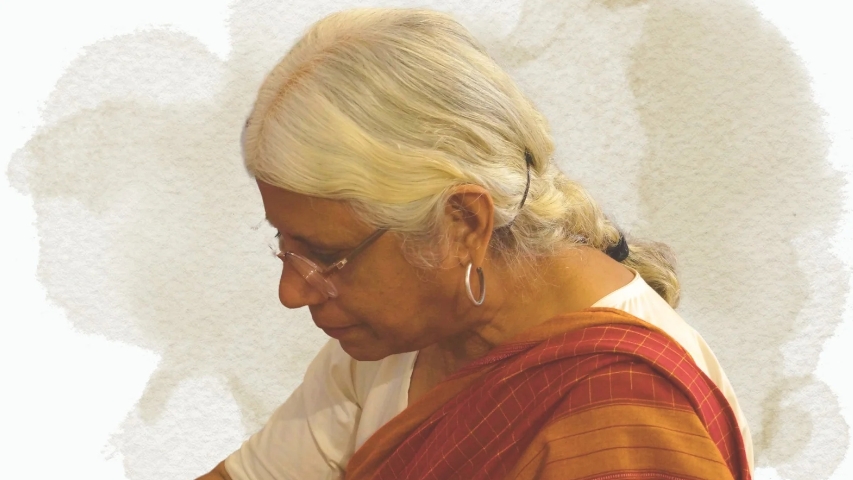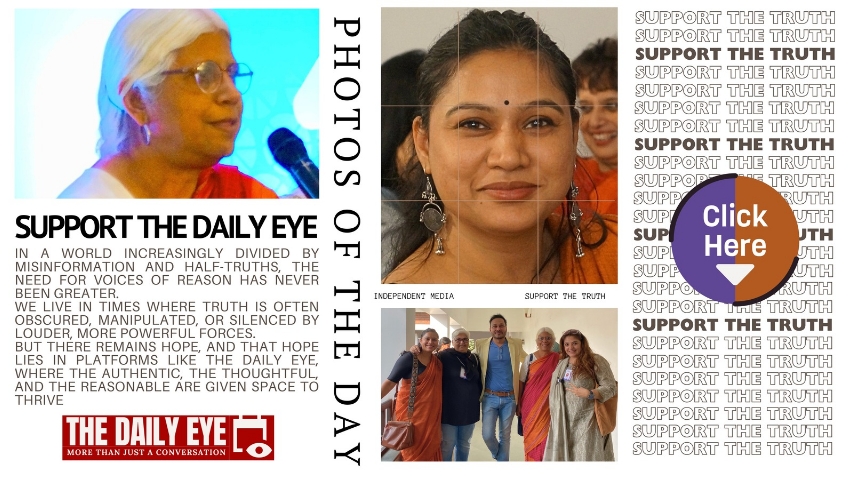
THOUGHT FACTORY: A CLOSE ENCOUNTER WITH BELA BHATIA
by Vinta Nanda November 30 2024, 6:40 pm Estimated Reading Time: 4 mins, 25 secsChampioning justice, Bela Bhatia’s inspiring work in conflict zones, and her book India’s Forgotten Country: A View From the Margins, highlights her unwavering commitment to marginalized communities. Vinta Nanda writes…
Photography: Vinta Nanda
Bela Bhatia, a renowned human rights defender and author of India’s Forgotten Country: A View From the Margins, has dedicated her life to advocating for marginalized communities across India. Known for her fearless work in Bastar, Chhattisgarh, Bela has exposed atrocities and empowered tribal women to seek justice, often at personal risk. Her contributions to global and local human rights issues, combined with her powerful storytelling, have made her a guidepost of hope. Sharing the stage with Bela at the Orange City Literature Festival highlighted the profound impact of her commitment to justice and democratic ideals.
In a world wrestling with the nuances of democracy, development, and dissent, meeting Bela Bhatia felt like encountering a beam of hope. Sharing the stage with her at the Orange City Literature Festival in Nagpur on November 24, 2024, was both humbling and inspiring. Bela, a human rights defender, independent researcher, writer, and lawyer, has dedicated her life to standing with the marginalized and oppressed, often at great personal risk. Her journey, marked by intellectual rigor and unyielding commitment, has shaped her into a voice of resistance for India’s most disenfranchised communities.
Hearing Bela’s insights that day, I was struck by how her work extends beyond India. Her experiences in Iraq and Palestine, where she co-authored Unheard Voices: Iraqi Women on War and Sanctions, have given her a global perspective on conflict and displacement. This intersection of local and international activism informs her nuanced understanding of systemic injustices and reinforces her relentless advocacy.

Sharing the Stage: Breaking the Mold
The panel, Breaking the Mold: How Everyday Stories Can Change Gender Norms, was a vibrant discussion alongside journalist and author Neha Dixit, whose recently released her book: The Many Lives of Syeda X: The Story of an Unknown Indian, activist Neerja Pathania, and clinical psychologist Koutilya Chhajed. Bela’s contributions were deeply thought-provoking. She emphasized the power of storytelling to expose hidden truths, inspire resistance, and mobilize change, stressing how stories intersect with gender, class, and caste.
As Bela discussed the role of her book in amplifying the voices of India’s “forgotten” citizens, her words resonated not just with the audience but also with me personally, leaving me reflecting on my own approach to storytelling.
An Unforgettable Conversation
After the panel, I had the privilege of interviewing Bela one-on-one. Sitting across from her, I was struck by her resolve as she spoke about the challenges tribal communities face in a rapidly shrinking democratic space. Despite the risks and obstacles, her belief in justice and the transformative power of advocacy remains unwavering.
Work in Bastar: A Decade of Advocacy
Bela’s most challenging work has been in Bastar, Chhattisgarh, a tribal-dominated region plagued by violent conflict between Maoist insurgents and state forces. Bela’s first visit in 2006, as part of a fact-finding mission into the state-sponsored Salwa Judum campaign, revealed mass displacement, systemic sexual violence, and a loss of tribal rights. These experiences compelled her to move to Bastar in 2015.
Reading about the years she spent helping tribal women file complaints against atrocities, including gang rapes in Bijapur, was a reminder of her courage in facing the ire of local authorities and vigilante groups, who labelled her a “Maoist sympathizer”. The terrifying January 2017 incident when a mob of 30 threatened to burn her home if she didn’t leave Bastar is well documented. Despite the threats, Bela’s commitment remains, as she continues to believe in the power of justice and democratic freedoms.
Her husband, development economist Jean Drèze, shares her commitment and has faced similar accusations of being a “foreign agent.” His words echo their shared philosophy: “I do not support Naxalite violence any more than I support state violence. Resistance to injustice must be through democratic means.”
The rise of surveillance and state-sponsored repression in India has added a new layer of complexity to Bela’s work. In 2019, she was one of 121 Indians targeted by the Pegasus spyware. This incident is telling of the precarious position of human rights defenders in a rapidly shrinking democratic space.
Despite these challenges, Bela remains committed. Her belief in democratic ideals and social justice fuels her advocacy, inspiring others to resist silence and apathy. Bela’s collaborations with peers like Soni Sori further illustrate her steadfast commitment to amplifying tribal voices.
India's Forgotten Country: A View From the Margins
Bela shared insights from her recently published book, India’s Forgotten Country: A View From the Margins. Listening to her describe the essays, which weave together personal experiences and extensive research, I felt the weight of her work. Her book sheds light on the lives of marginalized communities—Dalits, Adivasis, women, and bonded labourers—often ignored by mainstream narratives. For Bela, the book is a tribute to the resilience of these communities, transforming stories of suffering into testaments of survival and resistance.
You can grab your copy here:
https://www.amazon.in/Books-Bela-Bhatia/s?rh=n%3A976389031%2Cp_27%3ABela+Bhatia





-173X130.jpg)
-173X130.jpg)
-173X130.jpg)
-173X130.jpg)


-173X130.jpg)
-173X130.jpg)